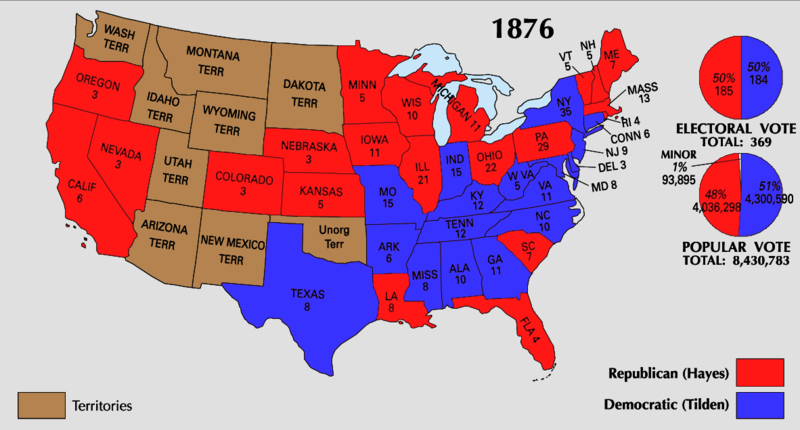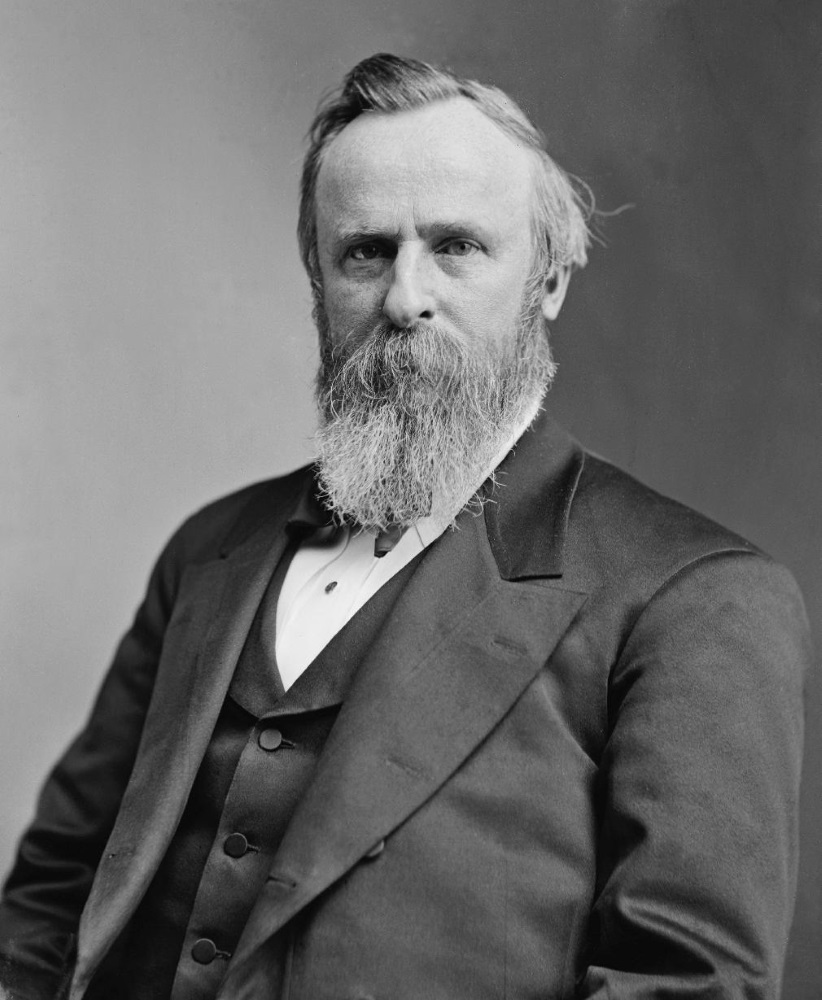|
|

 The 1876 election and the "Hayes Compromise" The 1876 election and the "Hayes Compromise"
 Labor troubles Labor troubles Reconstruction ends Reconstruction ends
The textual material on this webpage is drawn directly from my work America – The Covenant Nation © 2021, Volume One, pages 328-329. |

A Timeline of Major Events during this period
 |

|
|
Hayes vs. Tilden
The 1876 national election pitted the Civil War hero, then post-war Ohio governor, and strong Reconstructionist Republican Rutherford B. Hayes, against the Democratic Party candidate, New York Governor Samuel J. Tilden, well-known because of his crushing of the Tweed machine. Both men were excellent choices for the presidency.
Rutherford B. Hayes Samuel J. Tilden The Hayes Compromise The election was close, so close in fact that the results went into prolonged contest. Votes were recounted and challenges were made by both sides of the nearly equal results in a number of states' contests. Eventually the matter went before a congressionally appointed commission. But in the meantime Hayes had struck a deal with a number of Southern politicians, promising for their support the withdrawal of federal troops from the South, the support of a Louisiana governor's election in exchange for the promise of the protection of Black rights in that state, and the acceptance of a number of Southern politicians on his cabinet. This ultimately (March of 1877) swung the final decision of Congress in his favor, and finally in the summer of 1877 the new Hayes administration was ready to get down to business. But it would be an administration hampered greatly by the widely publicized compromises it was forced to accept in order to gain the White House.
|



|
|
In 1877 violence shook the Baltimore and Ohio Railroad Company, which was having a hard time maintaining profits and thus had announced a reduction in workers' wages. Strikes broke out across parts of Maryland, Pennsylvania, Ohio, and New York, and became violent when replacements (or "scabs" as the workers called them) were brought in to take over the jobs of the striking workers. Times were tough and replacements, particularly Chinese laborers,1 were abundant. President Hayes refused to get involved, although he did bring in troops to protect the property of the railroad companies. Eventually the strike simply limped to an end on its own. However Hayes did succeed in enraging the railroad workers when he then vetoed a bill passed by Congress restricting the use of Chinese laborers. Hayes's veto in turn helped to promote a Democratic Party victory in both houses of Congress in the 1878 elections. 1The
use of Chinese labor in labor-intensive industries was not uncommon in
those days. The tracks of the Central Pacific Railroad had been laid
across the high mountains of California and over the Nevada desert by
huge numbers of marginally-paid laborers brought in from a war-torn and
opium-ravaged China.
|

|
|
Despite Hayes's strong support of the rights of the Southern freedmen, the reality was that he was in no position to help them in the face of the rising White reaction building in the South. Also, mounting Indian problems on the American frontier were forcing Hayes to have to move his troops rather immediately from the South (which he had promised anyway) to the West to protect American frontiersmen. And with the removal from the South in 1877 of the military authorities charged with enforcing the Reconstruction laws, Reconstruction itself finally came to a dismal end. Blacks were now on their own in dealing with White power in the South.
Overall, huge mistakes were made in the follow-up to America’s most (self) destructive war, fought for supposedly noble purposes: the maintenance of the Union and the end to slavery. Wars are designed to change social attitudes. But instead the Civil War merely hardened them. Lincoln (and Johnson) wanted to bring the South back into the Union on an equal basis – minus slavery, of course – as fast as possible. But the Radicals wanted to punish the White South ... and anyone in the North who dared to show mercy to the defeated enemy. To the Radicals, the White South remained the enemy. And the White South ultimately responded in like manner, as soon as it was able to begin to recover. All that was achieved by the haughty moralizing of the Radicals was to ensure that Southern Blacks, which they presumed that they were "saving," would find themselves even more deeply alienated from the rest of Southern society, because of their total dependency on the muscle provided by a vindictive North. When that muscle was lifted (around 1877), the Blacks found themselves trapped in a social setting that was fully desirous of seeking revenge on Southern Blacks ... in the same measure that the Radicals had sought revenge on Southern Whites. Lincoln had warned America in his Second Inaugural Address to leave judgment and wrath to God, and to move on: With malice toward none; with charity for all; with a firmness in the right, as God gives us to see the right, let us strive on to finish the work we are in; to bind up the nation's wounds; to care for him who shall have borne the battle, and for his widow, and his orphan – to do all which may achieve and cherish a just, and a lasting peace, among ourselves, and with all nations. Not until the Marshall Plan was undertaken in 1947 (to bind up the wounds of World War Two in Europe) did America come to understand the wisdom of "charity for all." Rather than punish the Germans (and the Japanese) at the end of the war – as the Radicals had punished the Southern Whites – America set itself in 1947 to the task to rebuild all of European society, former enemy as well as former ally. The results were amazing. Europe recovered and whatever social antagonisms had produced the war in the first place disappeared, the wounds of war were bound up, everyone was cared for, and a just and lasting peace among all nations resulted. That's not what happened in America after the Civil War. All the haughty moral judgment (condemnation) that made the Radicals feel so morally superior (as if they were the divine judges of mankind), served only to delay for a full century the recovery and the social integration in the South of both the Blacks and the Whites. Did America learn anything from the experience? Obviously not immediately ... and not without the arrival in the position of leadership after World War Two of those who understood deeply the wisdom of Lincoln’s Christian (not Secular, not morally "logical") stand. These "Wise Men" 2understood by moral or spiritual instinct (like Lincoln) that we live in a flawed world in which only God has the right to judge. As Christ taught the world around him, they understood that it was critical to seek not judgment against others but forgiveness and a readiness to come together (not as gods but as imperfect humans) and work to help move flawed human society forward through the power of personal fellowship. But sadly, many Americans, especially those that seek social power, prefer to place themselves in the position as "enlightened" judges over the rest of society. As history constantly bears out (such as the French, Soviet and Nazi Revolutions) – and as the era of post-war Reconstruction confirms – the by-product of such intellectual arrogance brings only further destruction and remorse, not new glories to human life. 2The term "Wise Men" has been widely applied to President Truman's group of advisors who helped him shape a post-World War Two peace ... since the publication in 1986 of Walter Isaacson and Evan Thomas's book, The Wise Men (Simon & Schuster).
|


Miles H. Hodges